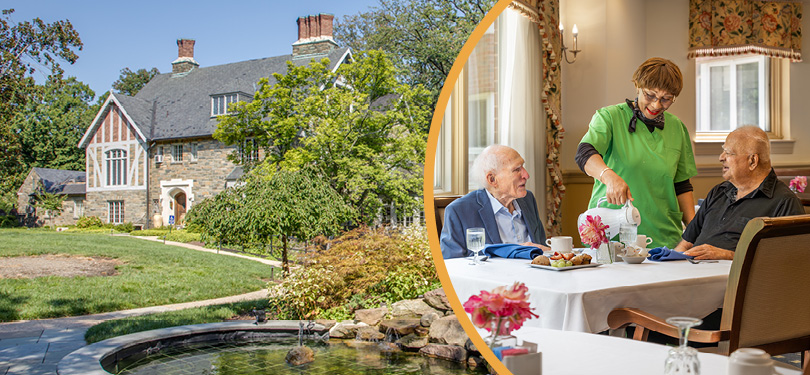You might have heard the phrase “continuum of care” thrown around in conversations surrounding assisted living and long-term care—but what does it actually mean?
A continuum of care (CoC), is a spectrum of comprehensive, integrated services that cater to the needs of aging individuals at all stages of health, in order to maintain well-being over time. A CoC’s purpose is twofold; it ensures that individuals receive the right care at the right time, and that smooth transitions are made—between location of care and healthcare providers. Plus, it grants peace of mind to their friends and family.
CoC services range from preventive-oriented measures to rehabilitative and recovery support, later increasing to palliative care. Let’s say an older parent experiencing cognitive decline who has been in assisted living for a few years now requires more nursing support. Ideally, they would be at a community where those services are all built in, so they don’t have to move communities with new staff who haven’t worked with their previous providers.
At Knollwood, a life-plan senior living community in Northwest Washington, DC, the idea of a CoC is built in; with living options like independent and assisted living, to services like memory care and on-site rehabilitation available. When a loved one comes to live at Knollwood, they can rest assured they won’t have to uproot the life they’ve created there, just because their needs have changed. This limits disruptions to their daily routines and lives.
How is this achieved? Here are some common characteristics of a successful CoC:
All-Encompassing Services:
Care should be viewed through a holistic lens—looking not only at the immediate physical issues of an individual, but how they affect their mental and emotional health, as well as their daily routines and loved ones. How can health providers prevent certain health problems from arising? What conversations can they have with family members to better gauge the individual’s needs?
Coordinated and Connected Care:
In an ideal situation, all providers involved in the individual’s care at various stages of their journey would be in touch—in order to better understand the care they’ve had in the past to better inform future care. This reduces redundancy of services, potentially saving the individual’s family time and money.
Furthermore, open conversations are had between the family of the individuals and nursing staff, doctors and specialists, support staff, and insurance providers.
Convenience and Accessibility:
With a life plan community like Knollwood, living options and levels of service are available under one roof. An individual or couple may come for independent living to continue their active lifestyle, and over time require more assistance with daily tasks. They may need to transition to assisted living or require services like memory care or skilled nursing support.
Peace of Mind For Family and Friends:
It can be extremely difficult to care for an aging parent or loved one. With a CoC, adult children can rest assured their loved one is getting the best comprehensive care from licensed staff with experience for various levels of need. Plus, with the help of support staff, families can develop financial plans, long term care and procedures, and get all appointments scheduled correctly.
A senior-living, continuum-of-care environment should be engaging and supportive — not only for the residents, but for adult children participating in their ongoing care.
Conclusion:
With so many options for facilities offering specialized services, a continuum of care community can be a great option for anyone—whether for older adults looking out for their own health over time, or for adult children looking to get the best care for their loved ones.
_______________________
Learn more about the continuum of care services available at Knollwood— call (202) 541-0149 to schedule a personal tour!
